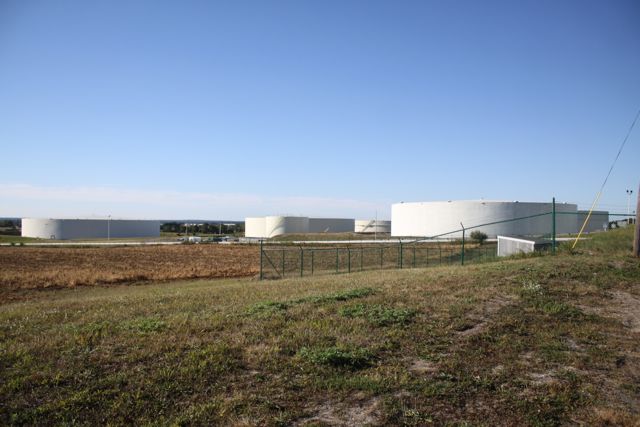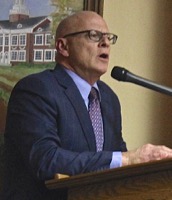The residents spoke and town officials heard them loud and clear.
By the time a three-hour public hearing ended last night at Riverhead Town Hall, a majority of the town board reversed its apparent course and now appears ready to reject United Riverhead Terminal’s special permit application to construct new storage tanks at its Northville fuel facility.
Councilman John Dunleavy, who last Thursday said he supported the company’s plan, told the standing-room-only crowd after the hearing ended: “You did a hell of a job. You changed my vote. I’m going to deny this permit.” His declaration drew cheers and applause from the audience.
“We’re here to represent our communities,” Councilman James Wooten added. “And that being said, we hear you.”
“I think there is a consensus building on this board that is in line with Councilman Dunleavy,” Supervisor Sean Walter told URT representative Vic Prusinowski at the conclusion of the hearing. “You guys have an uphill battle.” He kept the record of the hearing open until April 30 to allow the applicant time to answer questions in writing.
“The town board will either act on the application or request a lot more information,” Walter said. The town board has to “digest the information,” he said “and if it decides to move forward, the applicant will likely be required to prepare what Walter called “a limited environmental study.”
The board on Oct. 7 classified the action as “unlisted” for purposes of review under the State Environmental Quality Review Act. The resolution, adopted unanimously, “declares the action to be without significant impact on the natural or social or environmental and determined “that an Environmental Impact Statement need not be prepared.”
In last night’s marathon session — a continuation of another three-hour hearing held on Oct. 21 — speaker after speaker went to the podium to rail against United Riverhead Terminal’s special permit request.
 The company wants to build two 19,500-gallon ethanol storage tanks and a 1,500-gallon tank for gasoline additives and convert two existing heating oil storage tanks to gasoline storage. The converted tanks would store 3.6 million gallons of regular gasoline and 2.8 million gallons of premium gasoline, according to a document submitted by URT in October. The gasoline, ethanol and additives would be mixed at the facility’s distribution rack and dispensed to tanker trucks for distribution to gasoline stations throughout the region.
The company wants to build two 19,500-gallon ethanol storage tanks and a 1,500-gallon tank for gasoline additives and convert two existing heating oil storage tanks to gasoline storage. The converted tanks would store 3.6 million gallons of regular gasoline and 2.8 million gallons of premium gasoline, according to a document submitted by URT in October. The gasoline, ethanol and additives would be mixed at the facility’s distribution rack and dispensed to tanker trucks for distribution to gasoline stations throughout the region.
United Riverhead Terminal received an air facility permit from the state DEC in June 2014, authorizing it to store and dispense gasoline from tanks four and five at the site.
But many residents see the proposal as just the beginning of a larger-scale conversion of the facility, since home heating oil sales have been steadily declining.
Residents complained about the impacts of additional tanker trucks on the town’s already-congested roadways, expressing fears that the number of trucks would grow and the type of trucks traveling to and from the facility would grow larger. They reiterated prior requests for a full traffic study and an environmental impact statement.
The company says the conversion will result in no more than 12 additional truck trips per day — not enough, it argues, to warrant a full traffic study.

Attorney Chris Kent, representing the Northville Beach Civic Association, argued that URT should be applying for a change of use, not an expansion of a pre-existing, nonconforming use, since gasoline storage was discontinued at the site 13 years ago, he said.
“There will be a different type of customer, a different type of truck, a different type of business,” Kent told the board. “The proposed use is a discontinued use, and therefore a new use.”
The 286-acre waterfront site was first developed by Northville Industries in the 1950s, prior to the adoption of any zoning ordinance in the Town of Riverhead. Some of the 20 tanks currently on site date back to the 1950s, while others, as well as an off-shore platform, dates back to the 1960s. The facility has the capacity to store 5.2 million barrels.
Subsequent to its development as a fuel storage and distribution facility, the site’s zoning was changed by the town to residential. It is surrounded by land zoned for and developed with residential uses, with many homes dating back to before the development of the tank farm.
“Traditionally, nonconforming uses have received protection in order to allow property owners a reasonable time to recoup their investments,” Kent told the board.
“Nonconforming uses are intended to be phased out over time, as the law allows them a grudging tolerance,” he said. An expansion is inconsistent with the historical treatment of nonconforming uses, he said.
“We have granted them grudging tolerance long enough,” Kent said.
United Riverhead Terminal Response to Comments at Oct. 21, 2014 hearing
The survival of local journalism depends on your support.
We are a small family-owned operation. You rely on us to stay informed, and we depend on you to make our work possible. Just a few dollars can help us continue to bring this important service to our community.
Support RiverheadLOCAL today.































